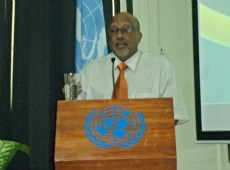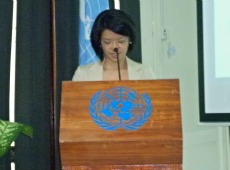The Maldives dominated this year’s Indian Ocean World Travel Awards (WTA) event, scooping a number of prizes during the ceremony hosted yesterday (May 12) at the country’s Paradise Island Resort and Spa – itself a winner on the night.
The Ministry of Tourism, Arts and Culture said the event, estimated to have cost around US$30,000 in shared expenditures for corporate sponsors and local authorities, will play a significant part in promoting the Maldives internationally this year.
Authorities have previously stated the ceremony would also provide a major boost to the reputation of the destination’s resorts for hosting events and conferences.
However, one senior local travel industry figure in attendance at yesterday’s ceremony told Minivan News that despite providing “great publicity”, concerns remained over the credibility of the WTA voting process – pointing to the high number of collaborators and sponsors receiving accolades.
The source, who asked not to be identified, said that without discrediting the night’s “worthy winners”, the announcement of certain accolades were met with “audible groans” by those in attendance during the ceremony.
Winners
According to the WTA website, the Maldives was awarded the accolades of the Indian Ocean’s leading beach, cruise and overall regional destination, beating competition from Madagascar, Mauritius, Reunion Island and Seychelles.
However, the country lost out to Mauritius in the categories of the Indian Ocean’s leading dive and honeymoon destinations for the year.
Maldives-based properties including the Conrad Rangali Island resort, W Retreat and Spa, Gili Lankanfushi, Baros Maldives, Sun Island Resort and Spa and Ayada Maldives all claimed accolades across a number of categories. These categories included the ‘Indian Ocean’s Leading Green Resort 2013’ and the ‘Indian Ocean’s Most Romantic Resort 2013′.
The evening’s winners also included Ibrahim Nasir International Airport (INIA) in Male’, which was recognised as the ‘Indian Ocean’s Leading Airport 2013’. The Maldives Marketing and PR Corporation (MMPRC) was also honoured as ‘Indian Ocean’s Leading Tourist Board 2013’, while Minister of Tourism, Arts and Culture Ahmed Adheeb was recognised as the ‘Indian Ocean’s Travel and Tourism Personality’, according to the WTA.
Other winners included the ceremony’s host venue, the Paradise Island Resort and Spa, which took several awards during the evening. Local operators including Atoll Paradise and Lets Go Maldives were also awarded. A new award in the category of ‘Outstanding services to the Tourist Industry, Indian Ocean’ was presented to Sri Lankan Airlines.
The WTA said in promotional material that Sri Lankan Airlines, Lets Go Maldives, the MMPRC and Jumhoree Party (JP) MP and presidential candidate MP Gasim Ibrahim’s Villa Group – operator of Paradise Island Resort and Spa – had all collaborated in bringing the awards to the Maldives.
Positive headlines
A senior tourism industry source present during the event said that the WTA ceremony would no doubt generate much needed positive headlines for the Maldives as a destination.
However, the source raised concerns about the credibility of some of the winners during yesterday’s ceremony.
“The nominees who put the most [money] into it often seem to get awards. Yet guests hang their hat on the outcome of such things,” said the senior industry figure.
The same source alleged that while there were winners on the night who deserved their accolades, the decision to grant awards to numerous key collaborators and sponsors of the event raised questions over the ultimate credibility of the event.
“I believe whichever destination is chosen has to pay to host the awards. This is part and parcel of such an event. It needs sponsors like airlines to cover transportation of staff and organisers and a place for them to stay. I guess this is how it works in terms of the economics, but this also creates a problem of credibility when the same groups win,” the industry insider alleged.
“Some of the the winners last night were certainly warranted, others not so much. I think most will take the awards with a pinch of salt.”
The source claimed that one award winner, alleged to be facing severe financial difficulties and failing to make substantial payments to creditors, nonetheless managed to scoop the top award in its category.
WTA response
A spokesperson for the WTA, which is this year celebrating its 20th anniversary, rejected any allegations of wrongdoing in its voting system.
“We are a totally transparent organisation and, in the last 20 years of World Travel Awards, have been regarded with the highest integrity in the tourism and hospitality world, hence our longevity,” the spokesperson stated.
The organisation added that details of how its voting system worked were available on its website. Minivan News was awaiting further response from organisation’s global business directors at the time of press.
Event hosting
Deputy Tourism Minister Mohamed Maleeh Jamal told Minivan News that hosting the WTA regional event would send a signal around the world concerning the country’s ability to host events and conventions.
“Last night was very important for expanding event-based tourism in the country and we are proud to host the awards,” he said. “This is not about dollars and cents, the event is about goodwill. Through his network, WTA President Graham Cooke last night ensured efforts would continue to promote the Maldives.”
Maleeh said that the total expenditure behind hosting such an event, which was shared with several corporate partners, was “quite minimal”, focusing on areas such as the transportation of guests and printing promotional materials. By comparison he said the rewards for the industry such as international media coverage and global publicity would be significant.
Tourism authorities over the last year have looked to bounce back from the perceived negative impacts of political uncertainty in the Maldives back in 2012 – narrowly missing out on obtaining one million visitors to the country during the course of last year.
With a recent high-profile campaign by petition site Avaaz.org potentially calling for a boycott of the country’s lucrative travel industry, Maleeh said events like the WTA award were an important means to leverage publicity.
He said that the event was especially important at a time when the country was officially celebrating 40 years since the inception of its tourism industry, helping authorities to overcome a limited promotional budget provided by parliament in the state budget.
Maleeh added that the success of hosting the WTA ceremony now paved the way for the country to host other high-profile events with a capacity of between 200 – 300 people in the future, as part of a planned expansion into meetings, incentives, conferencing and exhibitions (MICE) tourism.
With a number of the country’s exclusive island resorts offering convention facilities on site, Maleeh added that MICE would allow the Maldives to attract an entirely different segment of travellers – many likely to be first time visitors – to help generate word of mouth about the country.
“What we need to work on is more resorts to cater for this market, this will include trying to ensure that such events can be hosted beyond the Male’ area,” he said.
Maleeh claimed ahead of the WTA ceremony last month that the emergence of new regional airports around the country would open up a wider number of properties and businesses to potentially benefit from demand for MICE tourism.
He added that senior representatives from the World Tourism Organisation (UNWTO) were also scheduled to travel to the Maldives in September for a special high-profile panel discussion.

